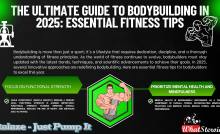Beat Overtraining For More Muscle Gains
One of the biggest enemies of every bodybuilder is overtraining. Have you ever got stuck to a point where no progression was noticed? Did you ever feel a total lack of motivation to get back in the gym and keep on training? Have you ever experienced such a bad soreness to be unable to work out for the next days/weeks? All these questions are related to overtraining and how it puts a big break on your muscle gains. Learn how overtraining affects your muscle gain process and how to defeat it.
What factors influence muscle grow? Yeah, right, reach nutrition, proper workout are key points in packing on muscle mass fast. Contrary to these, inappropriate training routine can hold you back from reaching your goal and keep you on a stage where no gains are seen. In the worst cases, muscle loss is registered.
“The more you workout, the faster you gain muscle mass.” This is true, but only to some point. Working out until you get totally exhausted and do not allow your body enough time for recovery will not lead you those big gains. It triggers an overtraining plateau and you risk to lose so hard gained muscle mass.
Recovery and Overtraining


It also is known as DOMS. During it the protein breakdown is greater than protein synthesis, leading to muscle growth. This is the kind of fatigue we work to induce in our body to cause it to build muscle.
Central Nervous System (CNS) fatigue is in the brain and it’s directly responsible for overtraining, longer recovery and training frequency. This is what we have to be concerned with since peripheral fatigue can be easily manipulated with proper diet and supplementation.
Must Read: How to Deal with Overtraining
Why is CNS fatigue so bad?
Because when triggered it begins to produce the catabolic hormone, which eats muscle mass. As you know we work out to get out body produce the more anabolic hormone, hence we build more muscle mass. With CNS fatigue in play, body got in the other side of the line and instead of packing on muscle, destroys it.
You feel demotivated, performance lowers and no progression is registered - welcome overtraining! Directly, if there something you have to avoid at all costs than CNS is number one at the top.
What Triggers CNS Fatigue?
Know the causes to avoid them in the future. Especially those related to training, because they play the biggest role.
1.Training to the Point of Muscle Failure


Training to failure shouldn't be taken lightly. Better to avoid if not sure you can handle it.
A controversial subject because of its efficiency. If some bodybuilders see it as a time-proven technique of muscle growth, others take it as a certain way to bury muscle gains.
Training to failure is when the muscle doesn’t produce enough force to finish the movement. many professionals recommend it as a good way to put some extra stress on muscle tissue, hence cause greater muscle growth.
Training to failure is a dangerous technique that has not to be treated lightly. Unless you are a professional bodybuilder, with years of gym experience you are not recommended to make use of it.
This is because failing to move a weight is very taking for CNS.
The same can be said about assisted training to failure reps. Contrary to popular beliefs, these movements cause no benefits, while putting big amounts of stress on CNS.
In turn, you get stuck into plateau stage and risk to compromise your muscle gains. Solution? Complete the number of reps you feel sure to do and stay away from those extra reps you cannot perform till the end or need to be assisted.
2- Too Heavy training
Exhaustive training can compromise your muscle gains and health as well.
Your goal in the gym has to be to work out well, but not in such a degree to feel overly tired when leaving the gym. Doing so is a straight way to overtraining.
Trying to get the most from a single session by working out insane will squeeze off your energy, causing a longer recovery frame time.
3- Lack of Sleep
Muscles grow while we sleep. Keep this in mind every time you short you resting time. Don’t expect for your muscle to grow if you sleep less than 7-8 hours a day. Recovery happens faster during sleep, so make you feel better and keep on muscle gains get at least minimum sleep hours.
Must Read: The Importance of Sleep for Bodybuilders
How to Recover from CNS Fatigue?
For a better understanding of you feel, take CNS as motivation. Lack of it means that CNS is not recovered yet, and you have to wait for several days before coming back to the gym. A strong desire to work out is a sign that CNS has recovered and no risks of overtraining are following you.
As rule, training with a fresh CNS would be more productive than a fatigued one. That’s why create a training schedule that fits your level and needs, avoided training techniques that are dangerous for you, uses the proper amount of sets and reps based on your athletic skills level.
Must Read: How Many Sets for Each Exercise?
Learn to listen to your body. Don’t be afraid to take some off gym time, because in long term this will bring you more benefits and will keep you safe.
Recent Posts
Creatine vs Myostatin: An Expert’s Analysis
Myostatin, a protein encoded by the MSTN gene, acts as a regulator of muscle growth.…
Raloxifene (Evista) 101: A Non-Surgical Solution for Gyno
Raloxifene, a selective estrogen receptor modulator (SERM), is one of the most valuable yet less…
Mastering Bodybuilding in 2025: Top Fitness Tips for Success
Bodybuilding is more than just a sport; it's a lifestyle that requires dedication, discipline, and…
Why Post-Cycle Therapy (PCT) Fails After a Nandrolone Cycle
Nandrolone, or Deca Durabolin, is an injectable anabolic steroid often used by bodybuilders during the…
Counteracting Anabolic Resistance with Adaptogens in Aging Men
As people age, maintaining muscle mass and strength becomes increasingly challenging due to a natural…
Tips on How to Store Peptides and HGH
When peptides are mixed with bacteriostatic water (BAC water), their longevity is highly influenced by…


